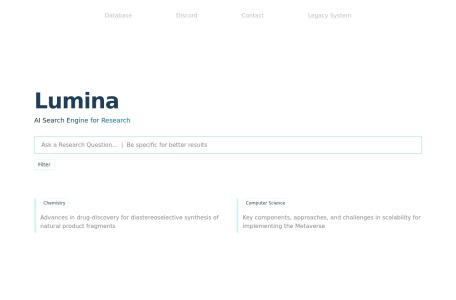What is Lumina?
Lumina is a completely free AI-powered academic search engine. Its search results have an average relevance that is 5 times higher than Google Scholar. It supports searching for over 100 million research subjects and is truly completely free. Lumina offers fast response, one-click PDF file filtering, multi-dimensional filtering options, and features an AI summarization function to help users quickly obtain abstracts and key information from research papers. Lumina also supports 24 languages, aiming to enhance the efficiency and depth of academic research.
The main functions of Lumina
- Here’s the English translation of your text:Fast Search Response: After users enter keywords, Lumina can provide highly relevant literature search results in an extremely short time.
- One-Click PDF Filtering: Lumina supports users in quickly filtering and accessing PDF-formatted academic papers for viewing.
- Multi-Dimensional Filtering: Users can perform detailed filtering of search results based on criteria such as year, citation count, publication type, and specific journals.
- High Relevance Ranking: Lumina’s search results outperform other academic search engines, such as Google Scholar and Semantic Scholar, in terms of relevance.
- AI Summary Feature: Lumina provides AI-generated paper summaries based on search results, helping users quickly grasp the core content of papers.
How to Use Lumina
- Visit the Lumina Platform: Access Lumina’s official website or the provided service interface.
- Enter Search Keywords: Input the academic research topic or keywords you want to search for in the search box.
- Execute the Search: Click the search button or press Enter to submit the search request.
- View Search Results: Lumina will quickly return a list of academic papers related to the search keywords.
The applicable population of Lumina
- Researchers: Scientific researchers who need to quickly access and analyze a large number of academic papers.
- Scholars and professors: Faculty members can use Lumina to search for materials when writing academic papers, preparing academic presentations, or conducting academic research.
- Students: Undergraduate or graduate students can use Lumina to search for academic resources when writing papers, preparing for exams, or conducting course-related research.
- Librarians: Librarians can use Lumina to improve efficiency when helping users find academic materials or conducting literature retrieval.








